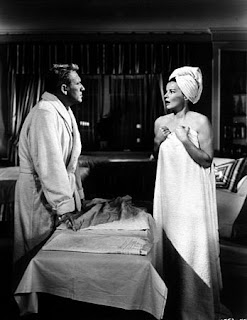Werth: With my yacht.
Wise: It's the anniversary of both the launch of the Titanic and the Johnstown Flood which makes it highly probable that something disastrous is going to happen today.
Werth: You can't avoid disaster, Wise. But you can prepare yourself by indulging in some classic disaster flicks and gleaning some tips for making it out alive.
Wise: San Francisco (1936) is one of the first great disaster flicks, setting the template for all the films that follow its lead. The film opens on New Year's Eve 1904, and stars Clark Gable as Blackie Norton, a casino owner from the wrong side of town, and Spencer Tracy as his best friend Father Mullin who happens to be the local parish priest. Blackie has no time for religion, but he is determined to spend his wealth trying to make things better for anyone down on his luck. After a fire ravages a run-down boarding house, Blackie offers a job to displaced chanteuse Mary Blake (Jeanette MacDonald) who has dreams of singing in the local opera house.
Soon, the two fall in love, but Mary flees into the arms of Jack Holt (Jack Burley), the richest man in town, when she realizes that she'll lose good-girl image if she becomes Jackie's bride. What she doesn't know is that her new beau made his fortune building shoddy tenements, leaving the city vulnerable to catastrophe.
Werth: Never date a contractor.
Wise: When that catastrophe strikes in the form of the famous San Francisco earthquake of 1905, the city is thrown into chaos and only those with quick wits and good morals survive. Gable plays a variation of his famous tough-guy persona, but he's also a man on a spiritual journey.
Contemptuous of religion, the tragedy forces him to confront both despair and the threat of losing the two people he loves most. Cast in the familiar role of the understanding clergyman, Tracy has less of an emotional arc, but his palpable chemistry with Gable makes them believable lifelong friends. MacDonald was the biggest star of the three at the time of the film, and it's interesting to see how MGM's star diva stepped away from the operettas for which she was famous and into a grubby, frontier town.
Werth: "As she stood in the ruins and sang. A-A-And saaannnggg!"
Wise: To be honest, for years I thought San Francisco was something of a joke, based mostly on the fun Judy Garland made of it when she sang the title song. But it's actually quite moving, full of the spectacle and big emotions that have become characteristic of this type of film. Nothing about it is subtle, but it's full of passion, of Clark Gable's snarls and tenderness, of Spencer Tracy's wry morality, and the peculiar—yet compelling—sight of Jeanette MacDonald stooping to a project she clearly felt beneath her, but still having a grand time.
Werth: San Francisco must be ground zero for cinematic disasters because Irwin Allen's hit epic, The Towering Inferno (1974), is also set there. Architect Doug Roberts (Paul Newman) is ready to leave the rat race behind after designing a 138 story skyscraper for building guru Jim Duncan (William Holden.)
But he soon uncovers some shady building practices that Duncan's son-in-law, the corner-cutting queen Roger Simmons (Richard Chamberlain in a rare unlikeable role) has been implementing to lower costs and pocket kickbacks, threatening the safety of the building. Unfortunately, while a red carpet opening event is in full swing on the top floor, an electrical box in a storage room that just happens to contain buckets of flammable material, a wall of Krylon spray-paint cans, and what looks like someone's discarded wedding dress bursts into flame and an evening of blazing terror in the world's tallest building begins.
Wise: Shelley Winters' swim team gold ain't gonna fix this mess.
Werth: After striking box office gold with The Poseidon Adventure in 1972, Allen stuck to his hit-making blueprint and stocked Inferno with just about every star in Hollywood. Aside from Newman and Holden, there's Steve McQueen as tough-as-nails Fire Chief O'Hallorhan; Faye Dunaway as Roberts' over-sexed wife; Fred Astaire as a dapper, washed-up con man;
Jennifer Jones as an art tutor with cheek implants that would make Madonna jealous; Robert Wagner as an executive who dips into the secretarial pool; and even O.J. Simpson as a take charge security officer who can't resist rescuing a kitten.
Wise: Making this scene the most ironic in Hollywood history.
Werth: All of those stars certainly attract attention, but unfortunately, there are too many of them to allow much character development. Newman and McQueen mix up a welcome testosterone cocktail whenever they are together, but for the most part the fragmented stories don't allow for the cohesion that Allen achieved in Poseidon. Inferno is too complicated and too cynical to achieve the heartfelt catharsis of its predecessor, but that doesn't stop it from being a hoot.
Like a cinematic flume ride, Inferno flies through its sometimes ridiculous plot providing the audience with the thrills it desires—mainly stars (and extras) screaming, falling and burning... in a couple cases all three at the same time.
While it falls short of the heights achieved in Poseidon, Inferno earned eight Oscar noms, winning three—including one for best song, "We May Never Love Like This Again" which, if you think sounds familiar, it's because it was both written and sung by the same folks who brought you the Oscar-winning song from Poseidon, "The Morning After."
Wise: With all this talk of disaster, maybe we should check out this week's premiere of After Earth.
Werth: I'd rather sit through the San Francisco earthquake... on fire...
Wise: Check back next week for more earth-shaking Film Gab!



















































